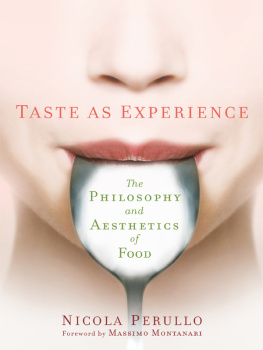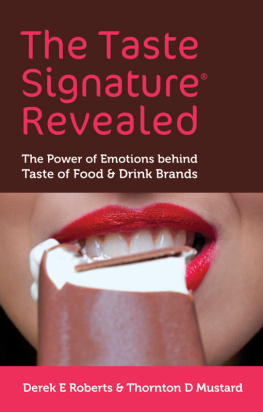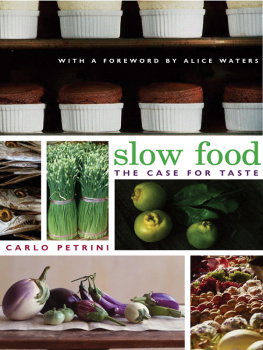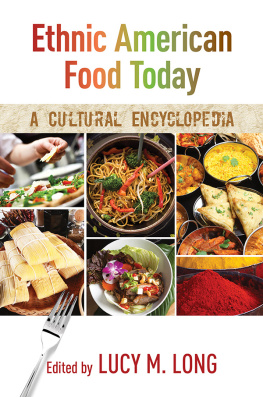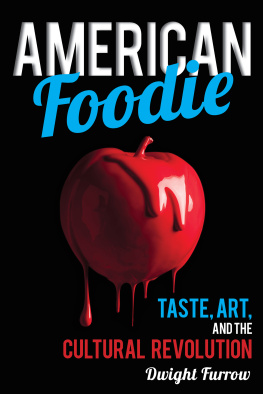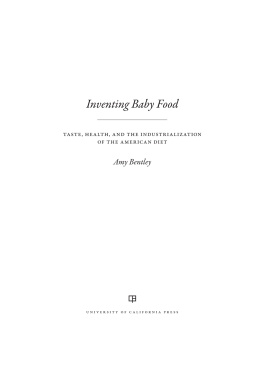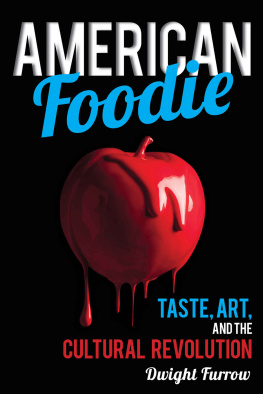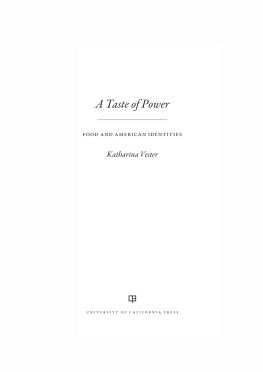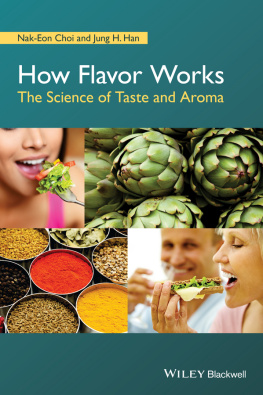TASTE AS EXPERIENCE
Arts and Traditions of the Table
ARTS AND TRADITIONS OF THE TABLE: PERSPECTIVES ON CULINARY HISTORY
ALBERT SONNENFELD, SERIES EDITOR
For a complete list of books in the series, see .
TASTE AS EXPERIENCE
THE PHILOSOPHY AND AESTHETICS OF FOOD
Nicola Perullo
COLUMBIA UNIVERSITY PRESS NEW YORK
COLUMBIA UNIVERSITY PRESS
Publishers Since 1893
New York Chichester, West Sussex
cup.columbia.edu
Copyright 2016 Columbia University Press
Italian edition: Il Gusto come esperienza, copyright 2012 Slow Food Editore S.r.l.
Via della Mendicit Istruita, 4512042 Bra (Cn) Italy
Phone: +39 0172 419611; Fax +39 0172 411218
editorinfo@slowfood.itwww.slowfood.itwww.giunti.it
All rights reserved
E-ISBN 978-0-231-54142-8
Library of Congress Cataloging-in-Publication Data
Perullo, Nicola, 1970-
[Gusto come esperienza. English]
Taste as experience : the philosophy and aesthetics of food / Nicola Perullo. American edition.
pages cm. (Arts and traditions of the table)
Translation of: Il gusto come esperienza. Bra, 2012.
Includes bibliographical references and index.
ISBN 978-0-231-17348-3 (cloth : alk. paper)
1. Gastronomy. 2. Taste. I. Title.
TX641.P473132016
641.01'3dc23
2015024701
A Columbia University Press E-book.
CUP would be pleased to hear about your reading experience with this e-book at .
Cover design: Mary Ann Smith
Cover image: Pando Hall/Getty
References to Internet Web sites (URLs) were accurate at the time of writing. Neither the author nor Columbia University Press is responsible for URLs that may have expired or changed since the manuscript was prepared.
CONTENTS
WHEN GOOD IS THE WISDOM OF TASTE: THREE STEPS TO A BETTER PERCEPTION IN EXPERIENCING FOOD
To demonstrate how honored and pleased I am to have this book translated into English for the American edition, I would like to briefly depict the motivation that generated it. This essay is the result of the intertwining of my theoretical reflection as a philosopher and my practical experience as a food and wine lover over the past twenty years. My initial interest in wine and food at the beginning of the 1990s was by chance, and only after a certain number of years was my expertise directed toward a theoretical path. Nevertheless, the theorizing that you will find in these pages is heterodox and not systematic. In fact, I have always found the valorization of food that doesnt take into account its experiential, narrative, and practical dimension to be paradoxical. Today this paradox looms large: there are numerous conventions, in many disciplines or cross-disciplines, on the importance of taste and gastronomy in which care is not taken to organize good convivial settings, to eat good food or drink good wine. Indeed, in some cases, there is only speaking and no eating. Either one speaks or one eats: this aut aut expresses a dichotomous and hierarchizing point of view on which much of our culture is based. Instead, the convivial experience proposes a different perspective in which real eating and metaphorical eating intertwine.
In effect, in the humanities and in philosophy there are different ways of approaching food as a theme of study, but I believe that increasing interest in this matter has been driven mainly by two different strategies. The first one can be called the rising strategy: food is important because it is Culture with capital C, that which is also called high culture in contrast to simple and material culture. This strategy has already been clearly expanded today. The second strategy, on the other hand, can be named the lowering strategy: food is important because all culture is food, in both the physical and the metaphorical sense. Or rather, beyond the opposition between the physical and the metaphorical. To state this, we need to see culture and knowledge differently, of course, and to deconstruct some stabile dichotomies and hierarchies. This essay follows this second strategy. In other words, my attempt has been to make philosophy with food rather than of food, stemming from a particular and heterodox phenomenological perspective. I would call it a phenomenology from inside since I attempted to describe the tasting experience by taking into account the active perspective of the participant more than that of the observer. This choice is due to my conviction that a philosophy of food, to the extent that it is a philosophy with food, depends on a transformational interrogation and not only on a descriptive one. Food is not only an object for reflection, but also a matter that affects reflection. The experience of food is specific perception: a direct relationship, a unique piece of the external solid world that we incorporate into ourselves. This suggests important assumptions and consequences for the way we think. Taste as Experience is therefore an attempt to approach food not as an object of study among others, but rather as a matter of a specific system that requires a specific narrative.
This essay is constructed around the concept of taste. Rooted in common sense, as has been frequently observed, is the idea that there is no possible way of constructively discussing what is good, in terms of that which is pleasing to taste. Discussions regarding goodness are often taken for granted and contained within the boundary of the seemingly obvious question of so-called subjectivity and objectivity. The problem of taste is the problem of the subject. More precisely, it is the problem of subjectivity in individual consciousness and awareness of identity. However, this definition has a history. The concept of taste as an individual response, in terms of pleasure and knowledge, sensorially external (visual, auditory, or, in the case of food, taste/ olfactory), is not, in fact, a very old one. It was born within the context of modernity, in which a new paradigm of consciousness was defined that determined the concept of something akin to subjectivity. This goes together with the idea that outside there is a world made up of objects. Taste then becomes a measure for recognizing quality and expressing values: the beautiful and the ugly, the good and the bad. Much of modern thought has proposed various solutions to guarantee that taste, as so defined, has its own legitimacy. Immanuel Kant, for example, wants to separate taste in the metaphorical sense, the taste for beauty, from physical taste, that of the palate. According to Kant, only the taste for beauty can be shared and therefore universal, not that of the palate since it does not allow for objectivity. The fact that we assimilate and incorporate external material brings about an extreme individualization of the perceptual experience, undermining its universal value. The question that arises in this essay is then: can we deconstruct this paradigm, which has become more or less established, and promote a different scenario that is both positive and useful? I suggest three steps that the reader will find through the chapters of the book.
First step: Show the complexity of taste by claiming expertise (especially know-how, competence). It is obvious that taste can be examined by separating out the collective shared recognition of quality from that of individual pleasure. The saying goes that theres no accounting for (discussing) taste, but discussions regarding taste are very frequent and this has a meaning. Taste does not only refer to the pleasure an individual experiences when eating, but also the recognition of the quality of what is eaten. The difference between pleasure and the recognition of quality depends on the capacity of the consumer: in gastronomy, it is through the acquisition of a certain

